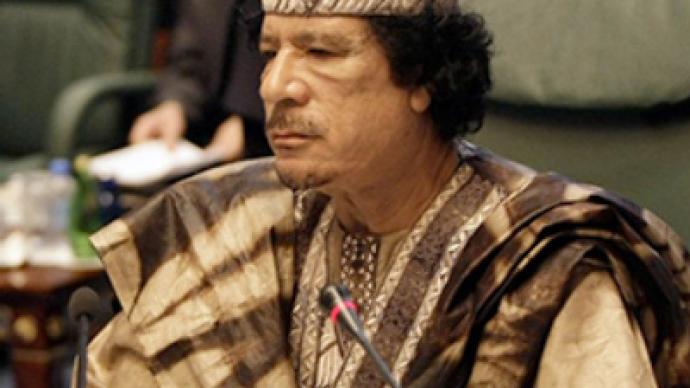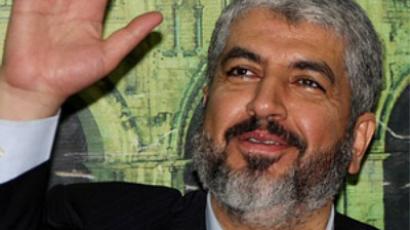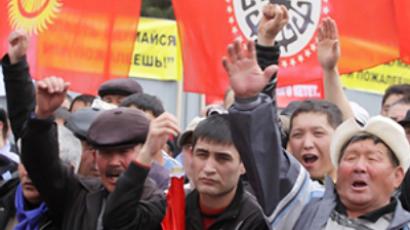Israel calls Libya’s flotilla bluff

A Libyan-chartered aid vessel carrying 2,000 tons of food and medicine is said to be nearing Gaza waters, while the Israeli navy maintains close surveillance.
The Libyan charity, headed by Saif al-Islam Gadhafi, son of Libyan leader Muammar Gadhafi, said on Tuesday that its chartered Gaza-bound humanitarian ship would continue on its voyage with a declared cargo of 2,000 tons of food and medicine after stopping in Egypt.
The ship, named “Amalthea,” set sail from Greece on Saturday on a trip that would ordinarily see it reach Gaza waters by Wednesday. According to Israeli media, however, the vessel docked in the Egyptian port of El Arish following warnings from the Israeli navy.
Egyptian officials said Tuesday that the captain of the Amalthea had requested permission to dock in the port, while charity organizers insisted the ship would continue on its voyage to Gaza.
“The Moldovan-flagged Amalthea had been loitering in international waters, and… said it had reported mechanical difficulties,” Haaretz, the Israeli daily reported. “Israel had also threatened to seize the ship should it try to approach Gaza.”
A spokeswoman for the “Gaddafi International Charity and Development Foundation,” who spoke on condition of anonymity, said that reports of a warning from Israel for the ship to dock in Egypt were false.
“The crew of the Amalthea made an independent decision to dock at the Egyptian port, citing mechanical problems,” the spokeswoman said. “As far as I can tell, the ship will complete its mission and deliver the intended humanitarian supplies to the desperate people of Gaza.”
Haaretz, quoting a spokeswoman in the Israel Defense Forces, said Israeli military vessels were following the Libya-sponsored ship, saying it was "88 km from Egypt and 128 km from Gaza in international waters,” and adding, “we are observing."
Al-Jazeera, the Qatar-based news channel that has a correspondent aboard the ship, supported the report saying that four Israeli warships were trailing the Amalthea. It was not clear, however, if the boat was anchored or continuing on its voyage to Gaza.
Asked on Israel Radio if the ship's position in international waters might deter the navy from launching an interception, Deputy Foreign Minister Danny Ayalon replied: "I don't want to get into matters linked to operational details … but certainly that's a consideration.”
Clearly, Israel is looking to avoid any repeat of events similar to those involving the Turkish-flagged Mavi Marmara, the largest of a six-boat flotilla that was intercepted by Israeli forces on May 30 in international waters on its way to deliver a humanitarian shipment to Gaza.
The ensuing clash between Israeli commandos and the crew of the ship left nine pro-Palestinian supporters dead and Israel with a seveely bruised international reputation. Israel was criticized for intercepting the Turkish-supported flotilla in international waters, which some observers compared to an “act of piracy.”
Aside from the deaths, the worst consequence of the clash seems to be damaged relations between Turkey and Israel.
Turkey, once Israel’s most loyal ally in the Muslim world, recalled its ambassador and canceled planned military exercises with Israel as the countries’ relationship shows no sign of healing.
Yet the high-profile clash, which put the international spotlight on the deplorable conditions in Gaza, prompted Israel to loosen its overland embargo with Gaza. Today, many essential goods are flowing into the 360-square-kilometer territory, which is home to about 1.5 million Palestinians, making the Gaza Strip the most densely populated area on the planet.
Israel has not dropped its sea blockade, however, citing the risk of arms shipments to Hamas.
On Monday, an Israeli military inquiry into the death of the Turkish activists concluded that although the mission was not perfectly executed, the Israeli commandos were justified in resorting to military force.
It is quite possible that Israel’s rather hasty release of this internal report was designed to make the 12-man crew of the Libyan aid ship, together with 10 pro-Palestinian activists, seriously consider the consequences of entering Gaza waters.














